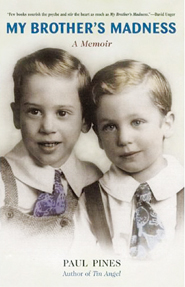home | metro silicon valley index | the arts | books | review

My Brother's Madness
Review by Richard von Busack
Here is one of those heart's-blood memoirs that can only be written after years of reflection, guilt and therapy. Paul Pines is an upstate New York teacher and therapist who earns many plaudits as a writer but no big money. At the memoir's beginning, he is working on an adaptation of his book The Tin Angel. As the bottom falls out of that deal, Pines simultaneously deals with the crack-up of his brother, Claude. Claude came within a few months of becoming an MD, but his fate was to fight schizophrenia for the rest of his life. What we learn here proves Sontag's Law: There is no greater human division then between the sick and the well. Paul tries to keep his life from vanishing down the vortex of his brother's illness and faces anger as he does: "If I wanted to talk about it, you wouldn't have to ask ... you did this to me." Did he? Peter searches his past. Beyond the common cruelty any elder brother visits on a younger, there is still a lot of familial rawness. Peter describes his surgeon father's second marriage to a vicious parasite, as well as his mother's monumental narcissism. Claude tries to keep himself alive as a grocery bag boy and is accused of a rape-murder by the police. He rallies and becomes an articulate spokesman for the mentally ill, while remaining a social pariah. Pines is a good writer, a dedicated brother and a Brooklyn-bred humorist. When he mentions the famous shoulders he rubbed, he never seems to be name-dropping. The schizophrenic feminist Shulamith Firestone, the actor Terence Stamp or the proto-punk musician Alan Vega are all there to illustrate the point that there's a difference between genius and madness.
(By Paul Pines; Curbstone Press; 318 pages; $15.95 paper)
Send a letter to the editor about this story.
|
|
|
|
|
|